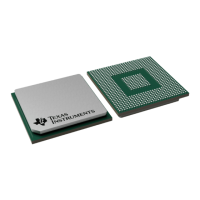TMS320C6455
www.ti.com
SPRS276M –MAY 2005–REVISED MARCH 2012
7.4 Enhanced Direct Memory Access (EDMA3) Controller
The primary purpose of the EDMA3 is to service user-programmed data transfers between two memory-
mapped slave endpoints on the device. The EDMA3 services software-driven paging transfers (e.g., data
movement between external memory and internal memory), performs sorting or subframe extraction of
various data structures, services event driven peripherals such as a McBSP or the UTOPIA port , and
offloads data transfers from the device CPU.
The EDMA3 includes the following features:
• Fully orthogonal transfer description
– 3 transfer dimensions: array (multiple bytes), frame (multiple arrays), and block (multiple frames)
– Single event can trigger transfer of array, frame, or entire block
– Independent indexes on source and destination
• Flexible transfer definition:
– Increment or FIFO transfer addressing modes
– Linking mechanism allows for ping-pong buffering, circular buffering, and repetitive/continuous
transfers, all with no CPU intervention
– Chaining allows multiple transfers to execute with one event
• 256 PaRAM entries
– Used to define transfer context for channels
– Each PaRAM entry can be used as a DMA entry, QDMA entry, or link entry
• 64 DMA channels
– Manually triggered (CPU writes to channel controller register), external event triggered, and chain
triggered (completion of one transfer triggers another)
• 4 Quick DMA (QDMA) channels
– Used for software-driven transfers
– Triggered upon writing to a single PaRAM set entry
• 4 transfer controllers/event queues with programmable system-level priority
• Interrupt generation for transfer completion and error conditions
• Memory protection support
– Active memory protection for accesses to PaRAM and registers
• Debug visibility
– Queue watermarking/threshold allows detection of maximum usage of event queues
– Error and status recording to facilitate debug
Each of the transfer controllers has a direct connection to the switched central resource (SCR).
NOTE
Although the transfer controllers are directly connected to the SCR, they can only access
certain device resources. For example, only transfer controller 1 (TC1) can access the
McBSPs. lists the device resources that can be accessed by each of the transfer controllers.
Copyright © 2005–2012, Texas Instruments Incorporated C64x+ Peripheral Information and Electrical Specifications 105
Submit Documentation Feedback
Product Folder Link(s): TMS320C6455

